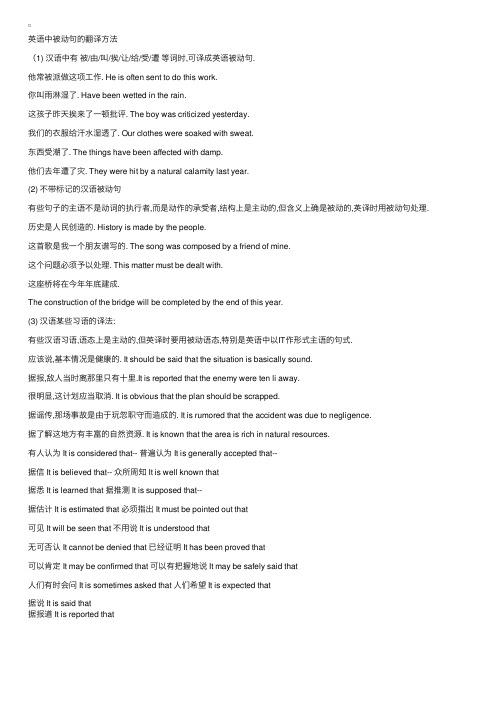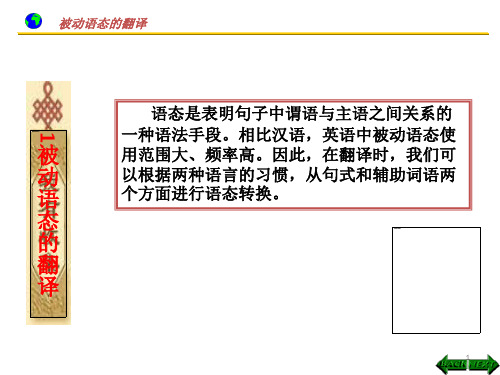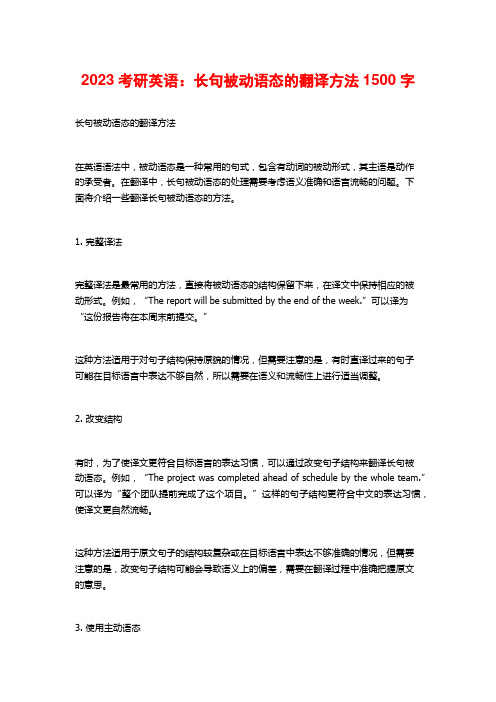被动语态的译法
被动句的翻译

被动句的翻译被动句的翻译桂萍英语中的被动语态和汉语被动语态相同,都表示句子的谓语动词和其主语之间存在逻辑上的动宾关系,是动词的一种变化形式。
被动句的主语实际上是谓语动词的承受者。
当行为主体(动作的发出者)不明确,或无关紧要时,英语中就经常使用被动语态,把所要说明的人或事物放在主语的位置上。
这样就突出了行为的对象,减少了主观色彩。
尤其是在科技英语中被动语态更是被大量采用。
被动语态的广泛使用是英语区别于汉语的一大特色。
汉语中虽也有被动句,但使用范围较狭窄。
许多被动意义的句子是用无主句的形式来表达的。
英语被动句的译法比较灵活,翻译时要根据句子的整体结构采用合适的方法来处理。
一般说来,被动句的翻译可以有以下四种方法:一、将被动句译成汉语的判断句汉语中常用“……是……的”这一句式来说明人和事物的客观情况。
这种结构在语义上往往具有被动的含义,可以与英语中的被动结构相沟通。
一般说来,英语中用来说明客观情况的被动句都可以转译成汉语的这一句式。
例如:1. The table is made of wood.这桌子是木制的。
2. Rome was not built in a day. 罗马不是一天造成的。
3. The United Kingdom is made up of Great Britain and Northern Ireland. 联合王国是由大不列颠和北爱尔兰组成的。
4. The sign language is used by the deaf people.这种手势语是聋哑人使用的语言。
5. The telephone is invented by Alexander Graham Bell in 1876 . 电话是亚历山大·格雷姆·贝尔在1876年发明的.二、将被动句译成汉语的主动句具体说明如下;1. The United Nations Secretary General said much would be achieved when the whole world acted together. 联合国秘书长说只要国际社会共同努力,很多事情都能完满解决。
英语中被动句的翻译方法

英语中被动句的翻译⽅法(1) 汉语中有被/由/叫/挨/让/给/受/遭等词时,可译成英语被动句.他常被派做这项⼯作. He is often sent to do this work.你叫⾬淋湿了. Have been wetted in the rain.这孩⼦昨天挨来了⼀顿批评. The boy was criticized yesterday.我们的⾐服给汗⽔湿透了. Our clothes were soaked with sweat.东西受潮了. The things have been affected with damp.他们去年遭了灾. They were hit by a natural calamity last year.(2) 不带标记的汉语被动句有些句⼦的主语不是动词的执⾏者,⽽是动作的承受者,结构上是主动的,但含义上确是被动的,英译时⽤被动句处理.历史是⼈民创造的. History is made by the people.这⾸歌是我⼀个朋友谱写的. The song was composed by a friend of mine.这个问题必须予以处理. This matter must be dealt with.这座桥将在今年年底建成.The construction of the bridge will be completed by the end of this year.(3) 汉语某些习语的译法:有些汉语习语,语态上是主动的,但英译时要⽤被动语态,特别是英语中以IT作形式主语的句式.应该说,基本情况是健康的. It should be said that the situation is basically sound.据报,敌⼈当时离那⾥只有⼗⾥.It is reported that the enemy were ten li away.很明显,这计划应当取消. It is obvious that the plan should be scrapped.据谣传,那场事故是由于玩忽职守⽽造成的. It is rumored that the accident was due to negligence.据了解这地⽅有丰富的⾃然资源. It is known that the area is rich in natural resources.有⼈认为 It is considered that-- 普遍认为 It is generally accepted that--据信 It is believed that-- 众所周知 It is well known that据悉 It is learned that 据推测 It is supposed that--据估计 It is estimated that 必须指出 It must be pointed out that可见 It will be seen that 不⽤说 It is understood that⽆可否认 It cannot be denied that 已经证明 It has been proved that可以肯定 It may be confirmed that 可以有把握地说 It may be safely said that⼈们有时会问 It is sometimes asked that ⼈们希望 It is expected that据说 It is said that据报道 It is reported that。
被动语态的译法

3.译成带表语的主动句 1)The decision to attack was not taken lightly. 进攻的决定不是 不是轻易作出的 作出的。 不是 作出的 2)He (Barrymore) then continued his walk down the alley. His (Sir Charles’) body was found at the end of it. 然后巴里莫尔继续沿着小道走下去。查尔斯 爵士的尸体就是在小道尽头发现的 发现的。 是 发现的
2.原文中的主语在译文中作宾语 1)By the end of the war 800 people had been saved by the organization, but at a cost of over 200 Belgian and French lives. 大战终了时,这个组织拯救了八百人 这个组织拯救了八百人,但那是 这个组织拯救了八百人 以二百多比利时人和法国人的生命为代价的。 3)Mr. Billings cannot be deterred from his plan. (人们)不能阻止比林斯先生实行他的计划。 不能阻止比林斯先生实行他的计划。 不能阻止比林斯先生实行他的计划
二、译成汉语被动句
汉语也有用被动形式来表达的情况。这一 类句子,都是着重被动的动作,有些说出 了动作的主动者,有些则不说出动作的主 动者。英语被动句译成汉语被动句时往往 借助于以下各种方式:
1.“被……”或“给……” 或 1) Any minute we would surely be spotted by enemy planes flying in and out of the airfield. 我们随时都会被进出机场的敌机发现 都会被进出机场的敌机发现。 都会被进出机场的敌机发现 2) I started to explain that I could not do my best since my spectacles had been taken away from me, but she wouldn’t let me finish. 我开始解释,我不可能干得很好,因为我的 眼镜已给拿走了 已给拿走了,但她不准我讲完。 已给拿走了
被动语态的翻译

被动语态的翻译
[<]
英语中以it 做形式主语,以被动语态作谓语,其后跟一个由that引导的主语从句的结构很多。这种结 构在译成汉语时,除把it一律省略外,通常有两种处理方法: 1.在被动语态前加“人们”、“有人”、“我们”、“大家”等词 2.用“据……”等短语译出
2). It is estimated that Americans spend up to five years of their lives in that tedious, stressful but unavoidable process known as waiting. 据估计,美国人一生中, 在乏味而令人厌烦, 却又躲避 不掉的等待上所耗费的时间,竟达五年之多。 英语中这种it做形式主语的被动句型在各类文章中比 比皆是,汉译时一般均按主动结构译出。即将原文中 的主语从句译在宾语的位置上,而把it做形式主语的主 句译成一个独立语或分句。常见的固定结构如:
4) The monkeys were given sweet potatoes by scientists who wanted to attract them to the shore of an island.
科学家们给猴子白薯,想把它们引到海岛的岸边。
10
被动语态的翻译
[<]
B . 把被动语态译成汉语主动句 1). His pride must be pinched. 他这股傲气应该打下去。
17
被动语态的翻译
1.4 “It+ be+ past participle + that引导的从句”句型的翻译 A. 不加主语 It is hoped that... 希望…… It is reported that … 据报道…… It is said that... 据说…… It is supposed that… 据推测…… It may be said without fear of exaggeration that… 可以 毫不夸张地说…… It must be admitted that... 必须承认…… It must be pointed out that... 必须指出…… It will be seen from this that… 由此可见……
被动语态的译法

(一) 1.他气得说不出话来。 2.那人不可信。 3.但是,一个最主要的问题是,像目前这 样的大城市是否还要保存下去。 4.使用电子显微镜,能获得大得多的放大 倍数。
5.而且还研究出了做饭用的太阳灶。 6.过了一会儿,达成了一项协议。 7.应该教育儿童讲真话。 8.决不能把个人利益凌驾于国家利益之上。 9.必须使学生能在德智体三方面得到全面 发展。
例3.My first thirty years were spent in Western America. 我的前三十年是在美国西部度过的。 例4.The manuscript was sent to the printer in London a few weeks before the French Revolution. 手稿是在法国革命前几周寄往伦敦付印的。
例1.Yet, only a part of this energy is . used by man. 然而,人类只利用了这种能源的一部分。 然而,人类只利用了这种能源的一部分。 例2.He is revered and admired by all . of us. 我们大家都景仰他,钦佩他。 我们大家都景仰他,钦佩他。
一般说来,可译为无主句的英语被动 句多是描述什么地方发生、存在或消 失了什么事物的句子。另外,一些表 示看法、态度及告诫、要求、号召等 的句子,可译成汉语的使动结构。使 动结构的特点是:通常不提出施动者, 即为无主句;句中有“使”、“让” 等词。如:
例1.Every student must be helped to understand that only by painstaking study can he master English. 必须使每个学生懂得,只有刻苦学习,才能掌 握英语。 例2.The educational reform must be carried through to the end. 必须把教育改革进行到底。 例3.In no circumstances should erroneous statements be allowed to spread unchecked. 决不让错误言论自由泛滥。
2023考研英语:长句被动语态的翻译方法

2023考研英语:长句被动语态的翻译方法1500字长句被动语态的翻译方法在英语语法中,被动语态是一种常用的句式,包含有动词的被动形式,其主语是动作的承受者。
在翻译中,长句被动语态的处理需要考虑语义准确和语言流畅的问题。
下面将介绍一些翻译长句被动语态的方法。
1. 完整译法完整译法是最常用的方法,直接将被动语态的结构保留下来,在译文中保持相应的被动形式。
例如,“The report will be submitted by the end of the week.”可以译为“这份报告将在本周末前提交。
”这种方法适用于对句子结构保持原貌的情况,但需要注意的是,有时直译过来的句子可能在目标语言中表达不够自然,所以需要在语义和流畅性上进行适当调整。
2. 改变结构有时,为了使译文更符合目标语言的表达习惯,可以通过改变句子结构来翻译长句被动语态。
例如,“The project was completed ahead of schedule by the whole team.”可以译为“整个团队提前完成了这个项目。
”这样的句子结构更符合中文的表达习惯,使译文更自然流畅。
这种方法适用于原文句子的结构较复杂或在目标语言中表达不够准确的情况,但需要注意的是,改变句子结构可能会导致语义上的偏差,需要在翻译过程中准确把握原文的意思。
3. 使用主动语态有时,在目标语言中,被动语态的表达习惯不如主动语态常见。
这时可以考虑将被动语态转换为主动语态来翻译。
例如,“He was given a medal for his bravery.”可以译为“因为他的勇敢,他被授予了一枚勋章。
”这种方法适用于目标语言中主动语态比被动语态更常见的情况,但需要注意的是,转换成主动语态可能会导致一些语义和逻辑上的变化,需要在翻译过程中进行准确判断和调整。
4. 省略被动结构有时,在译文中,可以通过省略被动结构来实现翻译。
例如,“The book was written by a famous author.”可以译为“这本书是一位著名作者所写。
第四部分被动语态的译法

七、被动语态的译法法
18
Over the years, tools and technology
themselves as a source of fundamental innovation have largely been ignored
by historians and philosophers of science. (95考研)
31
④用英语句中的动作者作汉语中的主语
The complicated problem will be solved by them.
这个复杂的问题会被他们解决。
他们将会/会解决这个复杂的问题。
七、被动语态的译法法
32
The planets are held together by attractive forces. 行星被引力聚在一起。 引力把行星聚积在一起。
42
I have excluded him because, while his accomplishments may contribute to the solution of moral problems, he has not been charged with the task of approaching any but the factual aspects of those problems 主干:一分为3,原因,让步 Exclude:与include相反 Accomplish:完成 contribute to:捐献-有助于、有利于 Solution:解决办法;溶液 charged with:控告 – 有关 – 承担 –最难点!! Approaching:接近, 逼近 –触及 Factual:事实的 – fact not…any but:only - 仅仅
被动语态的翻译技巧

被动语态的翻译技巧
被动语态是一种句子结构,在中文翻译中,可以使用以下技巧来表达被动语态:
1. 改变主谓结构:将主语变为宾语,将宾语(或部分宾语)变为主语。
例如,将英语句子"John was given a present by Mary."翻译成中文时,可以改为"玛丽给了约翰一份礼物。
",将"John"变为宾语,将"Mary"变为主语。
3. 调整语序:在中文翻译中,可以根据需要来调整句子的语序,以表达被动意义。
例如,将英语句子"The letter was sent yesterday."翻译成中文时,可以调整语序为"昨天这封信被寄出了。
",使得被动含义更明显。
4. 使用"被动"结构的句型:在中文中,有一些特定的句型可以表达被动意义,如"被+动词+主语+宾语"的结构。
例如,将英语句子"The window was broken by the wind."翻译成中文时,可以使用"被+动词+主语+宾语"的结构,翻译为"窗户被风给吹坏了。
"。
以上是一些常用的被动语态的中文翻译技巧,具体的翻译方法还需要根据语境和句子结构进行灵活运用。
- 1、下载文档前请自行甄别文档内容的完整性,平台不提供额外的编辑、内容补充、找答案等附加服务。
- 2、"仅部分预览"的文档,不可在线预览部分如存在完整性等问题,可反馈申请退款(可完整预览的文档不适用该条件!)。
- 3、如文档侵犯您的权益,请联系客服反馈,我们会尽快为您处理(人工客服工作时间:9:00-18:30)。
去年这个地区遭受了六十年来最严重的旱灾。
I was so impressed by these words that I used them later for a Christmas card.
Review
Can you answer a question which I want to ask and which is puzzling me?
我有个问题弄不懂,想请教你,你能回答吗? There are many wondeout
Structure of Passive Voice 英语中使用被动语态的频率比较高,尤其是科
技英语。根据英国利兹大学John Swales 的统 计,科技英语中的谓语至少三分之一是被动态。 被动语态是客体型思维在语言中的表现,主动 语态是主体性思维的在语言中的表现 (objective thinking & subjective thinking)
Most of the questions have been settled satisfactorily; only a few questions of secondary importance remain to be discussed.
大部分问题已经圆满地解决了,只剩下几个次要问题需要 讨论。
各成员国为了共同的利益,自愿地接受协定规定的契 约权利和义务。
It would be astonishing if that loss were not keenly felt. 人们要是没有强烈地感到损失,那倒是奇怪了。
Mr. Billings cannot be deferred from his plan. 人们不能阻止比林斯先生实行他的计划。
Computers may be classified into analog and digital. 计算机可分为模拟计算机和数字计算机两种。
Energy can neither be created nor destroyed, a universally accepted law.
Review
Can you answer a question which I want to ask and which is puzzling me?
There are many wonderful stories to tell about the places I visited and the people I met.
Every country will be represented by its prime minister. 各国都将由总理代表。
Rivers are controlled by dams. 拦河坝把河流控制住了。
Summary
英语中被动语态使用范围很广。在英译汉过程 中,有时需要将被动语态译成汉语的被动语态, 或者是包含“把”、“使”、“由”的句子, 但是更多的时候是将被动语态译成汉语的主动 语态,因为受思维差异的影响(西方人的客体 思维 & 中国人的主体思维),英语多用被动 语态,汉语多用主动语态。
An interesting study of domestic life and health of nightshift workers was carried out by Brown.
布朗曾经做过一个关于夜班工人家庭生活和健康状况 的有趣研究。
The contractual rights and obligations which it embodies have been accepted, voluntarily, in their mutual interest, by the member countries.
电流不再继续流动,因为电路被绝缘材料隔断了。
Any minute we would surely be spotted by enemy planes flying in and out of the airfield.
我们随时都会被出入机场的敌机发现。
I think it likely that the train will be delayed by the dense fog.
能量既不能被创造,也不能被消灭,这是一条普遍公 认的规律。
From the earliest age, children should be allowed to make decisions and understand their consequences.
从孩子很小的时候起,就应该允许他们自己做决定, 并弄清楚其后果是什么。
我深深地为这些话所感动,于是后来我就把他们写在 了圣诞贺卡上。
Summary
英语被动语态译成汉语被动语态时,一般包含 “被…”或“给…”, “遭到…”或“受到…”, 以及 “为…所…”等句型。
V. Into Chinese Sentences with “把”、“使”、“由”
By evening the occupation was complete, and the people were chased off the streets by an eight o’clock curfew.
“由”
III. Into Chinese active voice (译成汉语主动句)
The sense of inferiority that he acquired in his youth has never been totally eradicated.
他在青少年时期留下的自卑感,还没有完全消除。
他妻子寄给他的信件,大多数是由医院里的护士念给 他听的。
He was regarded as a Republican by everybody, even though he had always thought of himself as an “Independent”.
所有人都把他看作共和党人,尽管他一直认为自己 是“无党派人士”。
至傍晚,占领已告完成。八点钟开始的宵禁把人们从 街道赶走。
The famous hotel had been practically destroyed by the big fire.
大火使这家有名的旅馆几乎全部毁灭。
Most letters from his wife, are read to him by the nurse in the hospital.
II. The Translation of Passive Voice
Into Chinese active voice(译成汉语主动句) Into Chinese passive voice(译成汉语被动句) Into Chinese sentences with “把”、“被”、
Summary
英语被动语态翻译成汉语主动句时,有时原文 的主语在译文中可以作主语或宾语;有时可译 成带表语的主动句;有时可译成无主句。
IV. Into Chinese Passive Voice (译成汉语被动句)
Current will not flow continuously, since the circuits are broken by the insulating material.
the places I visited and the people I met. 我去过一些地方,也遇到了一些人。要谈起来,
奇妙的事可多着呢。
Lecture 14 Translation of Passive Voice
I. An Introduction to Passive Voice
Rainbows are formed when sunlight passes through small drops of water in the sky.
彩虹是阳光透过天空中的小水滴时形成的。
The ship was destined for London. 这艘船是去伦敦的。
我觉得这趟火车有可能会因大雾而被耽搁。
They were given a hearty welcome. 他们受到热烈的欢迎。
Our foreign policy is supported by people all over the world.
我们的对外政策受到全世界人民的支持。
The decision to attack was not taken easily. 进攻的决定不是轻易做出的。
常用被动语态句型及翻译定式
It is supposed that… It can be clearly seen that… It should be noted that… It may be safely said that… It must be stressed that… It has been proved that… It was estimated that… It is generally considered that… It was told that… It is well known that… It will be seen from this that…
The molecules of all matters are believed to be moving. 人们确信,所有物质的分子都在不停地运动。
My first thirty years were spent in Western America. 我的前三十年是在美国西部度过的。
